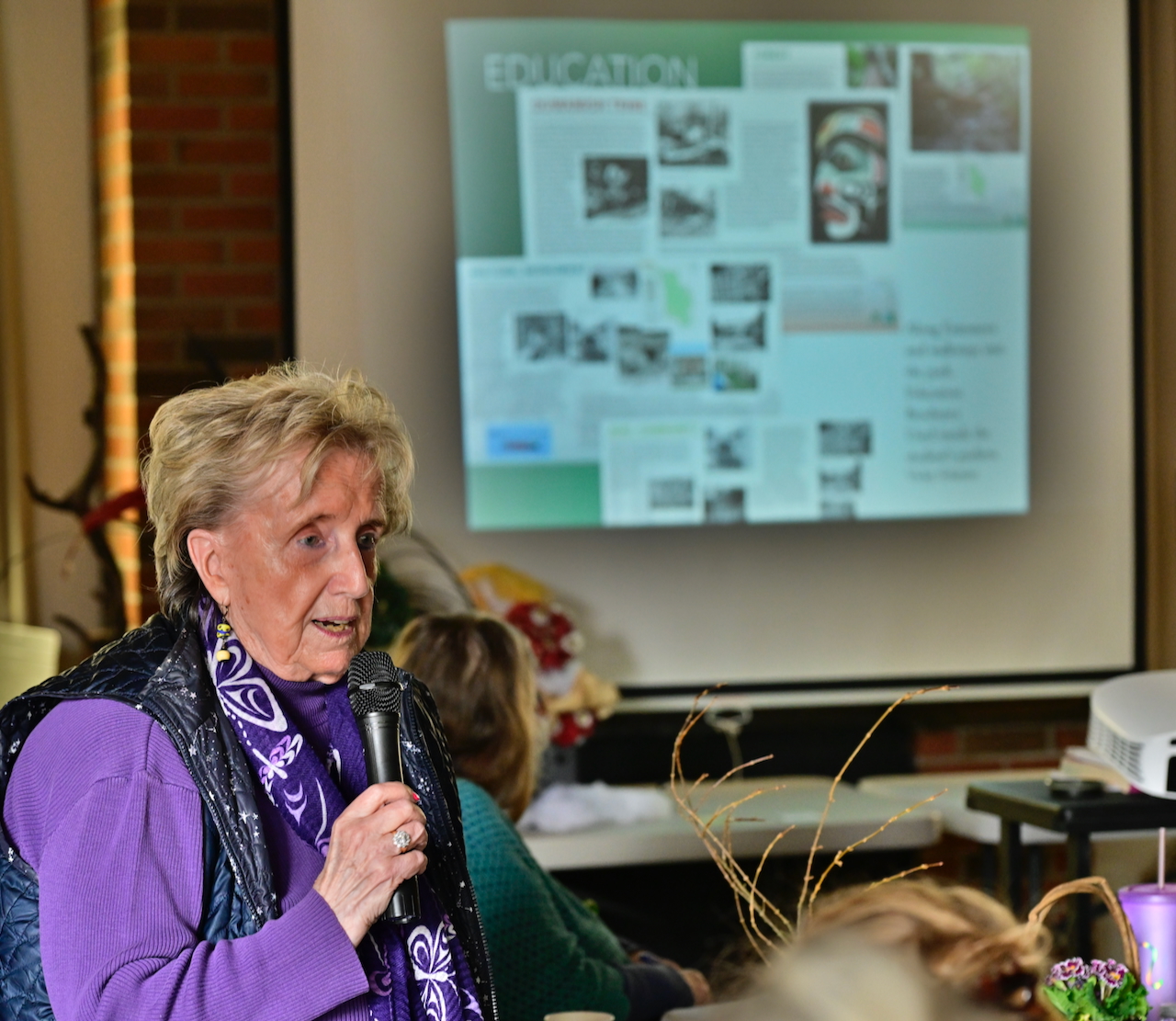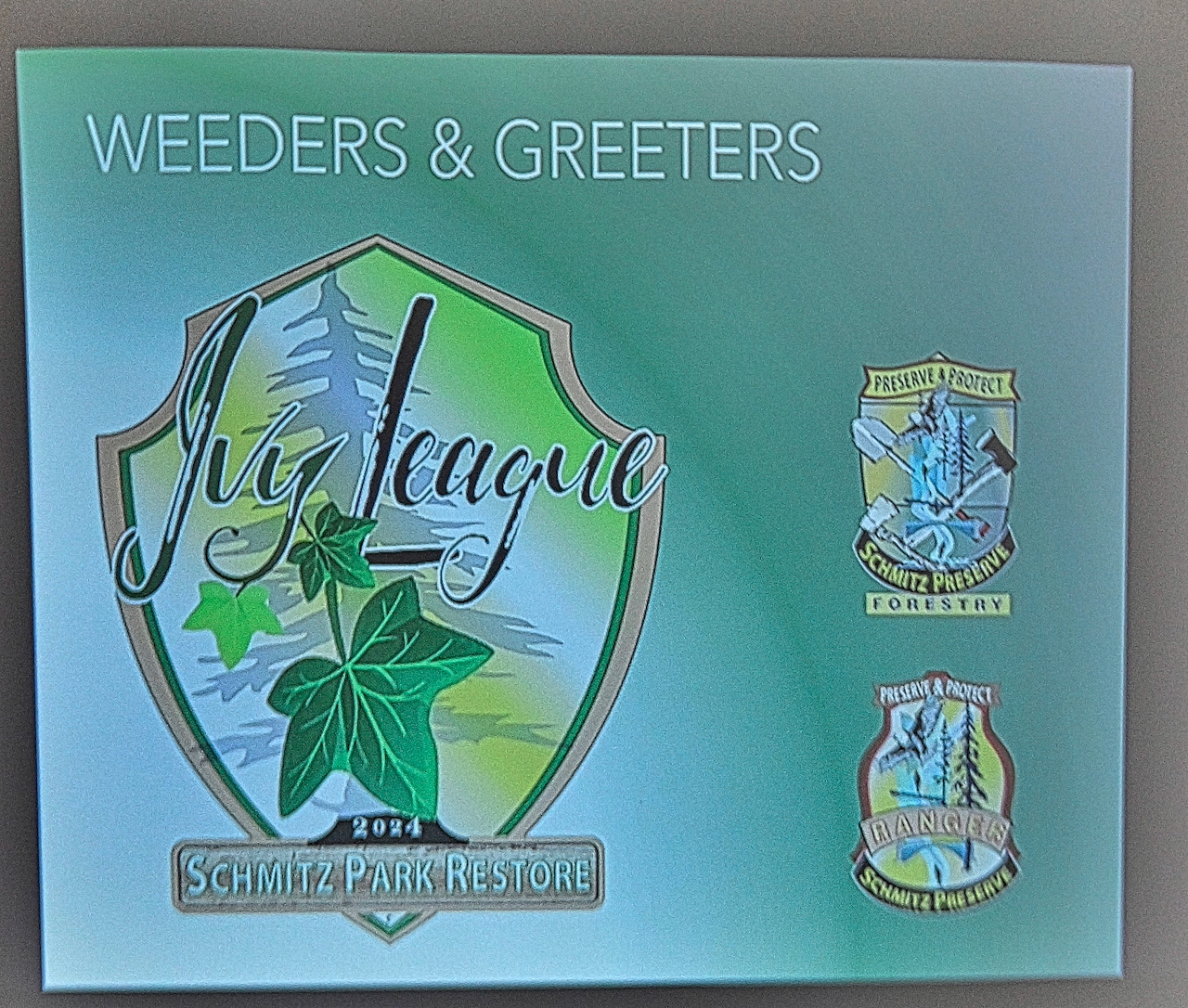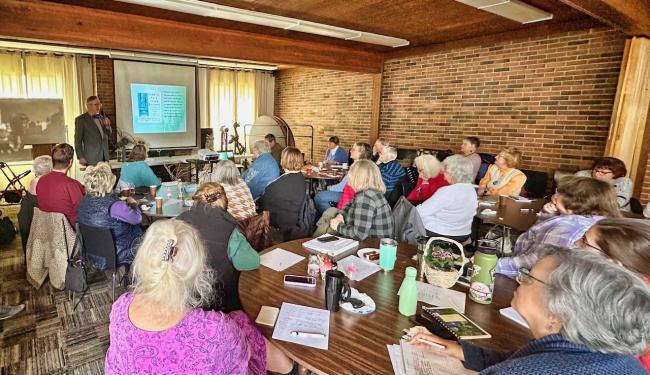Schmitz Park Creek Restore spreading its message of renewal
Dan Nye,Executive Director - Legal Affairs for Schmitz Park Creek Restore spoke before the Seattle District Garden Clubs meeting on Feb. 17 to talk about his group's efforts to re-daylight Schmitz Park Creek and preserve the park for future generations.
Photo by Patrick Robinson
Mon, 02/17/2025
Schmitz Park Creek Restore, a non-profit organization, has embarked on a series of presentations to spread awareness about their effort to restore Schmitz Park, its creek and take the creek to Puget Sound, bringing back the salmon run they maintain was part of its distant past. Their most recent was before the Greater Seattle District Garden Clubs meeting at St. Paul's of Shorewood Church on Feb. 17. Led by Executive Director Dan Nye - Legal affairs and Executive Director - Creative Brian Barilleaux, the group shared their vision for the park's future, emphasizing its historical and ecological significance.
Schmitz Park Creek Restore is a citizens committee that formed last year. The organization is focused on the park's fish, forest, creek, cove, and community. Their aim is to restore and protect the forest, reconnect Schmitz Park Creek to Puget Sound, and restore aquatic species to the ravine that holds the Schmitz Park forest.
According to the presentation, Schmitz Park contains 53 acres of ancient forest that has been undisturbed for hundreds, if not thousands, of years. This ancient forest is located in the middle of a band of forest that wraps around the west and southwest side of the Alki and West Seattle Peninsula. A restriction put in place by the Schmitz family ensures that nothing can be built in the park except for trails, helping the trails to remain.
The project also acknowledges the indigenous people who lived there long before others arrived. Alki was a central meeting place for tribes, and Chief Seattle welcomed the first settlers to Alki Point. Schmitz Park Creek was the source of fresh water for those settlers. The organization is working with David Buerge, the tribal historian for the Duwamish tribe. According to the presentation, Chief Seattle sought to create peace among local tribes and with the first non-native settlers, encouraging them to settle at Alki Point, promoting the sharing of technology and resources, and enjoying the beautiful environment together.
A key focus of the organization is creek restoration. The creek's water is sourced from artesian seeps, making it pure and suitable for salmon spawning. Currently, the water goes into a storm sewer and is discharged into Elliot Bay. The organization seeks to restore a historical salmon run to the creek.
To combat invasive species, the organization has created the "Ivy League," a group of volunteers that removes ivy, holly, laurel bushes, and other invasive species from the park. They meet every second Saturday and have already seen positive changes.
The organization also emphasizes community involvement. They are recruiting "greeters" to be at the park on busy days to hand out information, remind people to keep dogs on leashes, and prevent disturbance of vegetation. They aim to educate the Alki community about the park's heritage, community, forest, and fish. According to the presentation, the organization is working to involve students and create promotional ideas to encourage community involvement. They envision informational signage throughout the park to educate visitors about its history and ecology.
The organization is forming a 501c3 corporation to accept donations and support their work. They are collaborating with Seattle Parks and Recreation, Seattle Public Utilities, local merchants, and news media. They have also partnered with the University of Washington landscape design studio, whose graduate students developed designs for the park's restoration.
Looking to the future, the organization envisions a corridor from Alki Beach up into the ancient forest. This includes converting a block of street into a green belt and turning the Alki playfield into a freshwater marsh. They also plan to address sea level rise and potential flooding along Alki Beach. The organization is encouraging neighbors to garden in ways that promote the health and well-being of the green spaces, creating a "patchwork quilt" effect.

Vicki Schmitz, a member of the Schmitz family, expressed her excitement about the project: "I'm so excited about the fact that this wonderful group of people have taken on Schmitz Park and they're dedicated to ensuring that it's going to last another 150 or 200 or 300 years, longer than I will, but the Schmitz family, they were pretty extraordinary and farseeing for immigrants who came in the 1880s. So, I know that they're looking down and smiling on all of us to think at last they have help and that that park will last in perpetuity".
She also noted the importance of garden clubs, saying, "I look at you and just think oh my gosh good for you, good for you for belonging to garden clubs because they are the mainstay.". She recounted that a Schmitz family member would welcome students back to school each fall at the nearby school, reminding them of their "classroom in your backyard".

The organization's long-term goal is to raise $53 million, $1 million for every acre of the park, to form an endowment that would protect the park for the long term.


